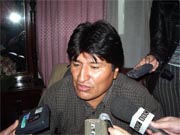Evo Morales restarts talks with Bolivian opposition
 La Paz - Bolivia's President Evo Morales started talks with the opposition Sunday after days of violent clashes between government supporters and protestors in the country's energy-rich eastern provinces.
La Paz - Bolivia's President Evo Morales started talks with the opposition Sunday after days of violent clashes between government supporters and protestors in the country's energy-rich eastern provinces.
At the same time, Morales ordered the arrest of the governor of Pando region, Leopoldo Fernandez, a leading opposition member, saying he must be put away for 30 years.
Fernandez allegedly orchestrated a "massacre" in Pando on Thursday, in which hired killers from Peru and Brazil killed dozens of government supporters, Deputy President Alvaro Garcia Linera said.
At least 25 people were killed in the Pando clashes, unofficial reports said.
Bolivia's crisis centres on Morales plans to hold a referendum on a new constitution in December, in which he aims to redistribute Bolivia's wealth in favour of the impoverished indigenous majority.
His opponents, descendants of European immigrants in the south and east of the country, demand 30 per cent of the tax returns from oil and natural gas revenues, which is currently used to provide pensions for all citizens.
No information was available on the outcome of talks between Morales and Mario Cossia, prefect of Tarija region, one of the five regions controlled by the opposition.
The leftist president declared a state of emergency for Pando on Friday and the military regained control over the provincial capital Cobija, without the previously feared firefights with opposition protestors, Bolivian media said.
The opposition blamed the government of making Fernandez, who said the government provoked the clashes, solely responsible for the violence. Former president Jorge Quiroga, a member of the opposition, demanded an international investigation.
International media representatives said the military prevented journalists from entering Cobjia.
Meanwhile, Branko Marinkovic, a key opposition leader, ordered the lifting of roadblocks in the wealthy Santa Cruz region, as a sign of goodwill.
The Union of South American Nations meanwhile called a crisis summit in the Chile, in which Morales agreed to participate. (dpa)